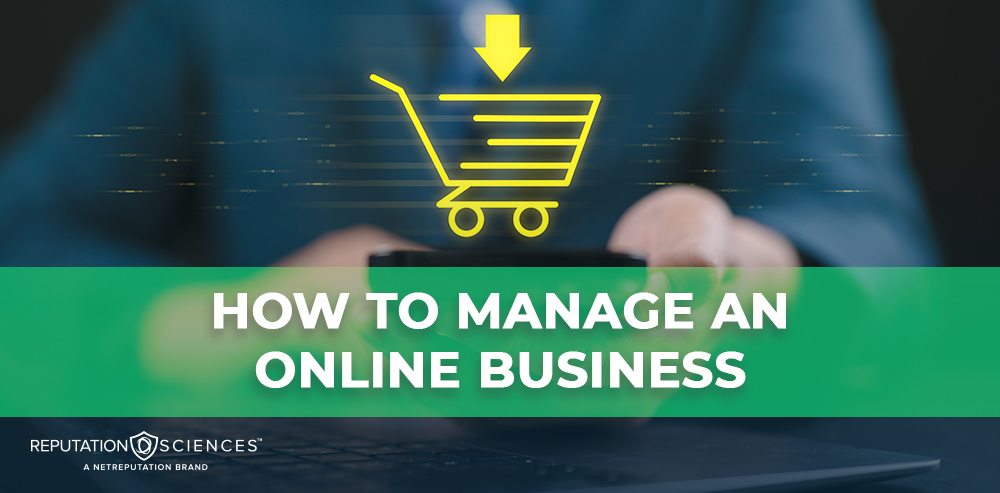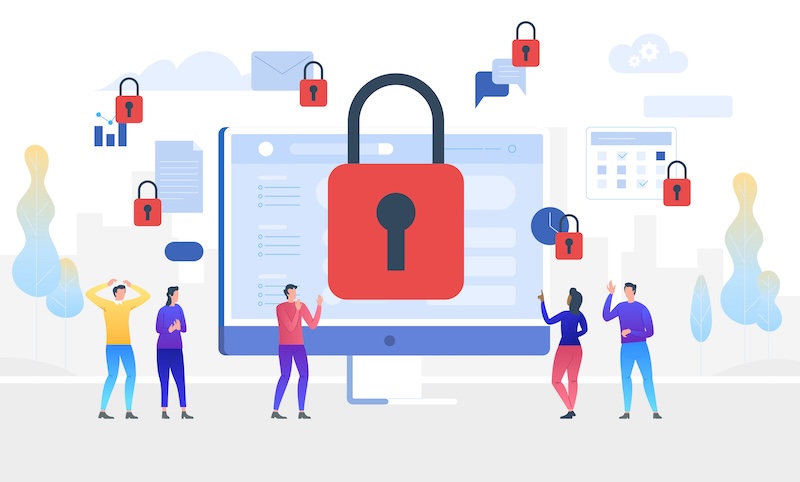How to Manage an Online Business

This article about how to manage an online business goes over the pillars of running your company on the internet.
Today, having a strong digital presence isn’t a luxury, it’s a necessity, especially if you have an online business. However, running a successful online business is a complex endeavor that requires a multifaceted approach.
You’ll need to do everything from come up with great product or service ideas and provide exceptional customer service to develop a brand identity, monitor reviews and listen to what people say about you and your company online.
In this article, we’ll discuss the core elements of building an online business so that you can run a successful brand that endures.
Lay a Strong Foundation

From defining your brand identity to selecting the online platforms you’ll use to connect with customers, every successful online business begins with a strong foundation.
Create a Brand Identity
To figure out and communicate your brand identity, ask yourself the following questions:
- What is your brand’s mission?
- What is your vision for your brand?
- Which values are at the center of your brand?
Next, develop a brand voice that reflects your business’ personality while resonating with your core audience.
When it comes to branding, one of the most important elements is to stay consistent anywhere your brand has a presence online. From your brand aesthetics to the way you communicate with your audience, consistency is key.
Select and Utilize Your Digital Platforms
Figuring out the online platforms to use for your brand is different from selecting the ones you like to use in your personal life. When it comes to your online business, it’s important to be present on the platforms where your target audience hangs out.
Once you’ve chosen the social media platforms to use, here’s how to get the most out of them:
- Fill out your profile to reflect your brand identity and communicate must-know information to your audience.
- Regularly post to your profile, and always reply to comments and DMs.
- Interact with other posts and users in your industry.
- Make sure to regularly use your social media profiles so they stay active.
- Consider paying for social media advertising to reach a larger audience.
Aside from social media, the platforms to consider include industry forums, e-commerce platforms (like Etsy versus Shopify, for example), and even search engines.
Prioritize those platforms, also taking into consideration if and how they align with your business goals and resources.
For example, if one of your business goals is to connect with professionals, you’ll probably want a presence on LinkedIn. Or, if you want to attract traffic to your website but don’t have a budget for advertising, organic traffic instead of paid traffic from Google will be your focus.
Pro Tip: Instead of trying to optimize multiple platforms at the same time, which can spread you too thin, pick one or two to start with. Once you’ve gotten into a rhythm with posting and engaging with your community on those platforms and you’ve started to grow your presence there, you can add one or two new ones to the mix.
Create High-Quality Brand Content
The content you create for your brand should educate, entertain or inspire your audience (or all three!). Everything you post for your brand should be valuable in some way.
Experiment with different content formats to find the ones that resonate best with your audience. You can create articles and blog posts, infographics, social media posts, videos, and more.
This is also a great way to repurpose content and get more traction out of each piece of content you create. For example, if you write a blog post on a topic, you can then turn that blog post into a podcast episode, YouTube video and Pinterest infographic.
Once you’ve created brand content, it needs to be optimized for search engines. There are a lot of elements to search engine optimization (SEO), so you may want to work with an expert who can teach you must-know strategies.
Design a User-Friendly Website
Every online business needs a website, whether you use it to sell products or as a landing page to promote your services. Whatever type of website you build, it has to be user-friendly. Otherwise, visitors are going to navigate away from it before you even have a chance to grab their attention.
A user-friendly website will adhere to the following best practices:
- It has visual appeal that’s interesting or intriguing to visitors
- The website is easy to navigate, meaning visitors can easily find their way around it
- It’s mobile-responsive, which means it can be viewed and used on any mobile device
- The website loads fast so users don’t have to wait to use any page
- There are strong calls-to-action (CTAs) that encourage conversions
Do you need help with your brand’s digital presence? Call us at (844) 458-6735 for an in-depth audit and valuable insights from an expert.
Provide a Great Customer Experience

Ensuring your customers have a great experience extends far beyond providing customer service. Here’s how to cater to your audience so they stay loyal to your brand.
Offer Reliable Customer Support
Whenever a customer has a question or leaves a review, reply as soon as possible. Both positive and negative reviews should be replied to.
According to BrightLocal, 88% of consumers would use a business that replies to all reviews, both positive and negative, while only 47% would use a business that doesn’t respond to its reviews.
Additionally, offer customer support across various channels. That way, customers can get in touch with you with questions or concerns no matter where they decide to spend time online. You can provide customer service via email, live chat, phone, and social media, for example.
Improve Customer Loyalty
One of the best ways to improve customer loyalty is to listen to what your audience says and make changes accordingly. If your customers love or hate something your business does, take that feedback to heart. Develop more products and services they’ll benefit from, and smooth out any mistakes that are getting in the way of the customer experience and your business success.
It’s also smart to personalize the customer experience whenever possible. Here are a few ideas:
- Address customers by name and use the communication channels they most prefer to get in touch with them.
- Segment customers by demographics so that your messaging directly targets them and appeals to their interests and needs.
- Use customer data to make personalized recommendations for products and services they’re likely to want.
Another idea is to create a customer loyalty program that awards repeat business. For example, customers can get points whenever they make a purchase, and then those points can be traded for money off a future purchase or a free item with a purchase.
Nurture Your Brand’s Community
Gaining customers is just the start — you have to nurture your audience and customer base to keep them coming back. Here are a few ways to do that:
- Ask customers for reviews, and always thank them for their feedback, whether it’s positive or negative.
- Create social media groups where members of your audience can connect.
- Participate in online forums to showcase your business as an authority in its niche.
- Host online events like AMAs and webinars to engage with your audience.
- Connect with influencers and industry leaders to reach a wider audience.
The way you’re perceived online matters, and a poor online reputation can damage your personal life and your professional opportunities. Find out how to create the online reputation you deserve by calling (844) 458-6735 today.
Monitor Your Online Reviews
According to Trustpilot, more than 93% of online shoppers read reviews before making an online purchase. If potential customers don’t see some current positive reviews, they’re likely to pick a competitor that does.
From keeping an eye on review sites to finding out what people are saying about your business on social media, it’s important to use listening tools so you always know the latest information that’s posted online about your brand. This is also essential for correcting misinformation before it has time to wreak havoc on your online business’s reputation.
Also, make sure to respond to all of the reviews you get as soon as you can. BrightLocal found that most consumers expect a response to their review within 2 to 3 days and no longer than a week.
That time window is even shorter if you’re using social media for customer support. Sprout Social found that when using social platforms to connect with brands, 30% of consumers expect a same-day response, 23% of consumers want a response within 1 to 2 hours, and 16% of consumers expect to get a response within minutes.
Focus on Online Marketing and Sales

From influencing organic search results to paying for advertising, no online business can succeed without a market strategy and a way to increase sales.
Use SEO Techniques
Search engine optimization (SEO) begins with keyword research to identify the search terms that are most relevant to your online store, audience and goals. From there, you can use those terms to optimize your content and website.
Building backlinks from high-quality websites is another SEO strategy that can make a big difference.
Since SEO takes a lot of expertise, consider hiring an expert to teach you must-know techniques or even handle optimization on your behalf.
Consider PPC Advertising
Pay-per-click (PPC) advertising allows you to run targeted ad campaigns on search engines like Google, as well as social platforms. These platforms will also let you track performance so you can make adjustments to reach your goals.
Retargeting campaigns can be especially useful. These types of ads let you recapture the attention of leads you lost. For example, if someone shows interest in your brand but doesn’t make a purchase, a retargeting ad can show them the product they were looking at and offer a discount code to encourage a sale.
Send Newsletters and Emails
It’s important to build a mailing list from the very start of your business. Once you have subscribers, you can send emails and newsletter campaigns to nurture those leads and increase conversions.
A lot of newsletter platforms allow you to segment your list based on demographics like interests and customer behavior. This lets you customize your email marketing in order to show customers the information they’ll be most interested in.
Additionally, utilize the newsletter platform’s reporting features to track open rates and CTR, which will let you determine how effective your emails are. You can then tweak your approach and A/B test to find what works best.
Analyze and Protect Data

From data analysis to protecting yourself and your customers online, these may not be the most fun parts of running a business, but they’re essential for your success.
Data Analysis
- Use website analytics tools to track stats like conversion rates, user behavior and website traffic.
- Most social media platforms will have business tools for analyzing metrics like conversions, engagement and reach.
- Analyze the data you’ve collected to see where you can optimize and improve your online marketing.
Customer Relationship Management
From the very beginning of setting up your online business, use a customer relationship management (CRM) tool to organize customer data, keep track of interactions, log preferences, etc. You can then use the data you collect to improve retention and improve the customer experience.
Data Security
Even small businesses need robust data security measures. This gives you the best chance of preventing cyberattacks on your business and keeping customer data safe.
- Use strong passwords, and change them often.
- Only use encrypted communication tools with conversing with customers.
- Always comply with data privacy regulations, like CCPA and GDPR.
- Run security scans to ensure your site and devices are free from malware.
- Update your website software and plugins whenever an update is available.
- Make sure the payment gateways you use for transactions are secure.
In the U.S., almost 40% of internet users are worried about how companies use their personal data online, DataReportal found. To make sure your customers feel comfortable when doing business with you, clarify the different ways that you keep their data safe.
ORM Services Can Help With Your Online Business

Managing a successful online business takes a ton of work, and your approach has to include every facet necessary to succeed. Customer experience, marketing, analytics, security and more are all components of running a company on the internet.
At ReputationSciences.com, we work with clients who are ready to create, grow or repair their digital reputation. Whether you’re prioritizing your personal or professional online reputation, our team of experts and tailored services can help.
Through our parent company, NetReputation, we offer a range of ORM services, including ad management, local SEO, review monitoring, content removal and more. Our tried-and-true strategy includes auditing, repair, monitoring and management, and our services will be customized to your unique needs.
From 24-hour monitoring to upscale content creation and promotion, our team of ORM experts can help you create the online presence you deserve. Contact us at (844) 458-6735 for more information.
